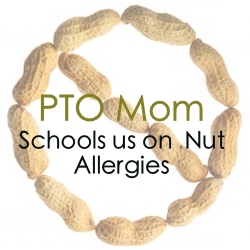Unfortunately, children who have food allergies are often excluded from school events that have to do with food. Sometimes the teachers don’t think to ask if the food is safe for everyone in the classroom while planning the event or the PTO/PTA don’t think to accomodate everyone.
This tends to happen a lot and unfortunately, most of the time, we cant do anything about it.
Q: “When my son started 1 st grade, he was constantly coming home crying because he was left out of a classmates birthday party celebration with the class. He brought in cookies that wasn’t safe for my son. I felt so bad listening to him tell me about how everyone ate them in front of him and he just sat there with his hands in his pockets because the teacher told him to do that for his safety. I wanted to scream. How do you help your child feel included in things you have no control over?” –Jamie T.
A: I completely understand how you and your child may feel right now. Have you tried to talk with your child’s teacher about a “safe snack bag” to be kept in the classroom for situations such as this one? I would try that first. Explain to the teacher that you do not want your child excluded from the celebration. Provide a travel size package of “wet one” wipes to clean your child’s area after the celebration is over so he doesn’t come in contact with any of the allergens. Making the child put his hands in his pocket while the celebration is going on may calm the teacher’s nerves but it will make the child feel as though they are being punished for having a condition they cannot control.
Q: “My daughter is allergic to peanuts, strawberries and milk. To ask for a nut-free classroom would be pointless,a s she has multiple food allergies. How do I make sure she is not excluded from school events when food is involved when the food is constantly entering the classroom? – Matthew M.
A: In situations where a child has multiple food allergies, I always suggest if it is possible to make the classroom food-free. Ask if during celebrations, they can encourage non-food related activities and items (ex: stickers, face paintings, crayons, etc). If it is possible to make the classroom food-free that would have the best outcome. If that is not an option, or the school doesn’t want to do that route, try to be as involved in the classroom events as possible. Volunteer to be “classroom dad” and volunteer during occasions when you know that there will be a celebration (ex: Halloween, Valentine’s day, etc). I also advise that you provide the classroom with some safe snacks to keep in the teachers desk in the event that someone brings something in that is not safe for your daughter.
Q: My son was recently excluded from a school event for “his own safety”. They had a birthday celebration in the classroom with cupcakes. He is allergic to milk, eggs and wheat. Because of these being in the cupcakes, and him being in contact with them, the teacher sent him to the office to give the secretary some papers. (This was merely an excuse to get him out of the classroom.) The teacher later told me why he did that. What should I do so my son doesn’t feel left out?- Kathy J.
A: When teachers purposely exclude a child for “his own safety” is not only completely wrong but it hurts the child more than they realize. Unfortunately, this will happen from time to time because some people just don’t understand how to work with the condition instead of against it. I would definitely talk to the teacher, one on one, and discuss your concerns with how he handled the situation so it doesn’t keep happening. Put a plan in place that you both can work with so your child can be in the classroom during these special occasions. Try to give as many suggestions to the teacher as possible to help the teacher understand the allergy and how to handle situations like this. Good Luck!
Q: “My daughter is in class with a boy, who she loves dearly, that has nut allergies. She doesn’t have any food allergies herself. I am a member of the PTA and help plan a lot of the school events. This boy’s mother is very adamant about food allergies so I want to make sure that I don’t hear her wrath, lol. How do I make sure that he is included in the activities while also not posing a threat to his health?” – Anonymous
A: You sound like you are speaking about my son and me, lol. Let me first say that I am extremely touched that you would even try to understand and go out of your way to help this boy feel included because you, yourself, are not a food allergy parent. It is admirable of you to try to educate yourself on this, so I thank you on behalf of all of us food allergies parents. As for making sure he is included, I would first develop a list of “safe” snacks, candies and foods that are 100% safe for nut allergy sufferers. If you do not know where to start, ask his mother. I am sure she would be touched to know you care enough to ask and will be willing to help so her child is safe. Once you have a list of safe foods, try to provide everyone that is involved in the planning of PTA events with a copy. This will help with the communication on the proper foods. When planning events, do your best to plan non-food related activities. This will keep everyone’s mind at ease. Remember though, some non-food items contain nuts (ex: lotions, soaps, bird seed, etc) so please always check ingredients.
The question below is quite offensive but I felt it needed to be added to see how some parents react to the accommodations of children with food allergies to keep them from being excluded.
Q: “Please do not be offended at my next statement but why should I go out of my way to provide accommodations to a child with food allergies? I understand it is serious but if we have to accommodate for them then they are getting special treatment. Shouldn’t they just deal with it and work around it? I don’t mean to be hostile but I don’t feel like I should have to go out of my way and go to a thousand stores to find “safe” foods when the parents of the food allergy kid can provide them for their child and I can buy what I want to for the classroom party.” – Debbie K.
A: I understand your frustration however this is not about accommodating a food choice like being vegan. This is about accommodating a child’s life threatening condition to which they have no control over. Providing a safe alternative is something most food allergy parents do, for the safety of the child, however it means the world to the parents and the child when people care enough about that child’s life to make sure there is no chance that child could die from a “birthday celebration” of their classmate. Here is a suggestion for you to accommodate a child with food allergies; send in non-food products for the celebration and leave the cupcakes at home to be celebrated with the family or send in stickers, pencils, crayons etc; all of which can be bought at the dollar store. If you have to send food, because your child really wants to do that for their special day, I understand that. In that case, maybe ask the teacher if there are snacks, that they know of, that are definitely safe. Give them a few days in advance, so they can ask the food allergy parents for a safe food idea, or to provide them with time to provide their child with a safe alternative so you can buy whatever you want. In the end, it is about the happiness and SAFETY of the students so please be understanding that this is not a life choice; it is a life threatening condition.
Thank you all for you questions!
Have a question regarding Peanut, Tree Nut or Other food allergies in school? Want to suggest a topic for me to discuss? Follow Me on Facebook @ www.facebook.com/ptomom or Contact me @ pto_mom@aol.com and follow my Inspiredeats column here.
Get “Schooled” on Food Allergies With PTO Mom!
*All information on this page is not to be taken instead of medical advice.*


